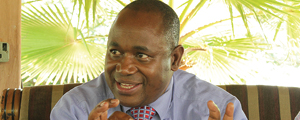
RESERVE Bank of Zimbabwe (RBZ) governor Gideon Gono yesterday vowed to defend his proposed supply side economic empowerment model despite a barrage of attacks from some quarters in Zanu PF calling for equity-based models.
Report by Bernard Mpofu
Speaking at the Confederation of Zimbabwe Industries breakfast meeting in Harare on the impact of reduced interest rates on the banking sector, Gono warned that applying the equity model alone could be detrimental given the recent performance of some companies following the gazetting of empowerment regulations.
The RBZ boss has been at the receiving end of criticism for opposing the equity-based model as championed by Indigensiation and Economic Empowerment minister Saviour Kasukuwere.
In 2008, the government enacted a law that compels foreign-owned companies to sell 51% shareholding to locals.
“I unequivocally support the empowerment programme and refuse to be drawn into name-calling by those who do not want to listen to other people’s ideas because they think that theirs are sacrosanct,” said Gono to the applause of captains of industries.
“As a celebrated house nigger, I remain a house nigger as others would have me called.
“I remain committed to upholding the ideals for which the indigenisation and empowerment programmes are founded through observing mutually reinforcing laws of this country, which include banking laws which ought to be observed.”
- Chamisa under fire over US$120K donation
- Mavhunga puts DeMbare into Chibuku quarterfinals
- Pension funds bet on Cabora Bassa oilfields
- Councils defy govt fire tender directive
Keep Reading
His remarks follow several attacks made on him in publicly-owned media describing his empowerment model as unsustainable.
The central bank governor has also been on a collision course with Kasukuwere over the modus operandi of the controversial programmme, now widely seen as Zanu PF’s election trump card.
“The observation from the 23rd floor of the central bank is that we seem to be emphasising on the equity approach without the supply side model accompanying us in that process,” Gono said.
“There are pitfalls to the former approach because the rewards are predicated from the dividends that will come from the profitable operations of the indigenised entities and we all know that dividends are really never certain.
“A good example is that Zimplats made a loss of $6,4 million soon after being indigenised.
“Now, what are you going to share? If you want me to stand by and not advise my President that there are losses to be shared for the next 10 years, forget it.
“A company can continue to make losses for as long as it exists, but it will require inputs and this is where I’m saying that if we decree that the inputs are going to come from the indigenous people, we are in it together.
“I’m not advocating for us dropping one in favour of the other, I’m simply calling for an inclusive approach.”
He said unlike the equity-based model, the supply side model, which lobbies for a compulsory threshold for companies to outsource from indigenous companies, would not be affected by the profitability of the company. The central bank governor added that there was need to reconcile various pieces of legislation in areas where there were ideological differences.











